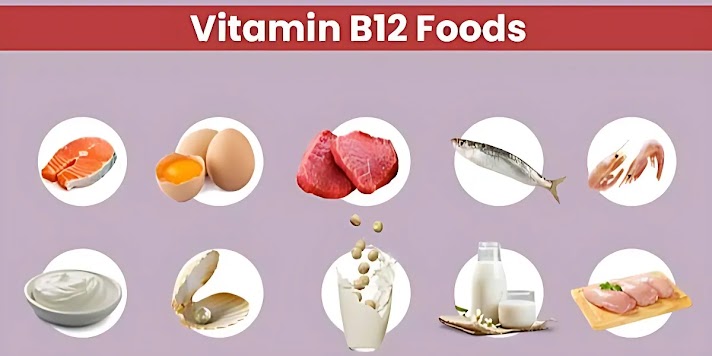Exploring the Significance of Vitamin B12: Benefits, Deficiency, and Dietary Sources.

Introduction: Unraveling the Importance of Vitamin B12.
Vitamin B12, scientifically referred to as cobalamin, is an indispensable nutrient that plays a pivotal role in upholding our overall health and vitality. Despite its profound significance, our bodies do not have the capacity to synthesize it naturally, necessitating its acquisition through dietary sources or supplements. In this comprehensive guide, we will delve into the realm of Vitamin B12, encompassing its description, merits, consequences of deficiency, and dietary reservoirs.
Understanding Vitamin B12: An Insight into Its Functions.
1. Red Blood Cell Production: Among its multifarious functions, Vitamin B12 stands out for its crucial role in the production of red blood cells. These cells are responsible for transporting oxygen throughout the body, ensuring that our organs and tissues receive the oxygen they require for optimal functionality.
2. Neurological Well-being: Vitamin B12 assumes a pivotal role in preserving the health of our nervous system. It facilitates the construction of the myelin sheath, a protective covering enveloping nerve fibers, which is instrumental in the efficient transmission of nerve signals.
3. DNA Synthesis: The vitamin also plays an essential part in the synthesis of DNA, the genetic material that resides within every cell of our body. This renders it indispensable for processes such as cell division and growth.
4. Energy Generation: Vitamin B12 is renowned for its involvement in the conversion of dietary fats and carbohydrates into energy, thus contributing significantly to our overall metabolic processes.
5. Immunity Reinforcement: The vitamin is instrumental in upholding a robust immune system, thereby fortifying the body's defenses against infections and ailments.
Health Implications of Vitamin B12 Deficiency: Recognizing the Ramifications.
Insufficient intake of Vitamin B12 can precipitate a slew of health complications, both immediate and protracted.
Some of the common issues associated with a Vitamin B12 deficit encompass:
1. Anemia: Vitamin B12 deficiency can give rise to a form of anemia known as megaloblastic anemia. This condition is characterized by enlarged and diminished red blood cells, leading to symptoms like fatigue, weakness, and pallor.
2. Neurological Manifestations: Prolonged deficiency can manifest in neurological symptoms, including tingling sensations, numbness, difficulties in ambulation, and cognitive impairments. In severe cases, it may culminate in irreversible nerve damage.
3. Persistent Fatigue and Debility: In view of Vitamin B12's role in energy production, its scarcity can result in chronic fatigue and enfeeblement.
4. Mood Disturbances: Certain individuals grappling with Vitamin B12 deficiency may encounter mood disturbances, such as mood swings, depression, or emotional instability.
9 Dietary Sources of Vitamin B12: Fostering Nutritional Well-being.
Having explored the importance of Vitamin B12 and the potential adversities associated with its scarcity, let us now focus on dietary sources that abound in this vital nutrient.
Here are nine nourishing foods teeming with Vitamin B12.
1. Meat: The consumption of meat, particularly organ meats like liver, stands as an excellent reservoir of Vitamin B12.
2. Fish: Fatty fish species, including salmon, trout, and tuna, are esteemed for their high Vitamin B12 content.
3. Shellfish: Clams, mussels, and oysters rank prominently among nature's sources of this vital vitamin.
4. Poultry: Chicken and turkey are poultry choices replete with Vitamin B12.
5. Dairy Products: Milk, cheese, and yogurt are dairy-derived options that provide a significant dose of B12, catering notably to individuals who incorporate dairy into their diets.
6. Eggs: Eggs are another naturally occurring source of this pivotal nutrient.
7. Fortified Cereals: Many breakfast cereals are fortified with Vitamin B12, making them a convenient option for those seeking to augment their intake.
8. Fortified Plant-Based Milk: Plant-based milk alternatives, such as soy, almond, and oat milk, are frequently fortified with Vitamin B12, catering to the needs of vegans and lactose-intolerant individuals.
9. Nutritional Yeast: Nutritional yeast, a staple in vegan cuisine, emerges as a commendable source of Vitamin B12.
Thirteen Vitamin B12 Supplements in India: Bridging the Nutritional Gap
While these dietary sources suffice for many, some individuals may need to explore supplements to ensure they meet their Vitamin B12 requirements.
Here are thirteen B12 supplements accessible in India.
1. Cyanocobalamin Tablets: Readily available, these tablets contain synthetic Vitamin B12.
2. Methylcobalamin Tablets: These tablets feature natural Methylcobalamin, preferred by some individuals.
3. B12 Injections: For rapid and direct replenishment of B12 levels, injections are an option.
4. B12 Sublingual Drops: Sublingual drops, placed under the tongue for swift absorption, are an alternative mode of supplementation.
5. B12 Nasal Sprays: Nasal sprays provide an avenue for quick absorption through the nasal mucosa.
6. B12-Fortified Nutritional Yeast: Nutritional yeast not only serves as a dietary source but also comes fortified with extra Vitamin B12.
7. B12-Fortified Breakfast Cereals: A plethora of breakfast cereals is enriched with Vitamin B12, providing a convenient morning boost.
8. B12-Fortified Plant-Based Milk Alternatives: Vegans can readily access B12-fortified plant-based milk options.
9. B12-Fortified Energy Drinks or Shots: Certain energy beverages and shots incorporate added Vitamin B12.
10. B12-Fortified Meat Substitutes: Vegetarian and vegan meat substitutes often feature supplemental B12.
11. B12-Fortified Protein Bars: Protein bars offer a convenient mode of B12 supplementation.
12. B12-Fortified Multivitamin Supplements: Multivitamins containing B12 are available for those seeking comprehensive nutritional support.
13. B12-Fortified Meal Replacement Shakes: Meal replacement shakes can be an expedient dietary inclusion, particularly for those leading fast-paced lifestyles.
Conclusion: Embracing the Virtues of Vitamin B12.
Before initiating any supplementation regimen, it is imperative to seek guidance from a healthcare professional to determine the appropriate dosage and ensure that individual nutritional needs are met. Additionally, routine monitoring of B12 levels can serve as a prudent practice to safeguard one's health.
In summation, Vitamin B12 stands as an indispensable nutrient with multifaceted benefits for the human body. An appreciation of its significance, coupled with vigilance regarding the signs of deficiency, can empower individuals to incorporate B12-rich foods or supplements into their dietary regimens, ultimately fostering enhanced health and well-being. Whether one adheres to a carnivorous, vegetarian, or vegan diet, there exists an array



0 Comments